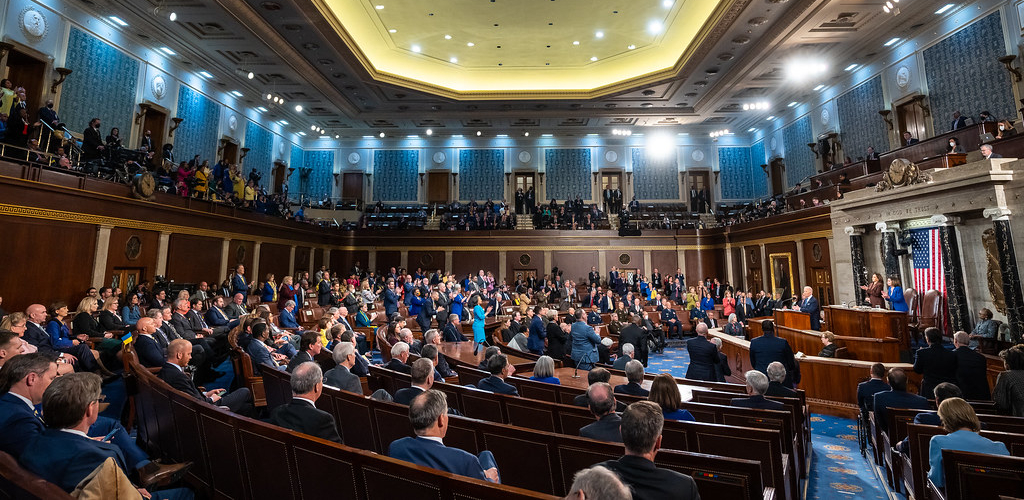What Will the End of the U.S. Foreign Policy Consensus Mean for the World?

Published by The Lawfare Institute
in Cooperation With

A version of this piece originally appeared in the Substack “Blue Blaze.”
The United States remains a superpower—indeed, the superpower. As such, its policies and preferences will shape every region of the world in the coming years and decades. The post-World War II U.S. foreign policy consensus frayed long ago, however, and no replacement concept has yet jelled. The problem today is more than just conceptual uncertainty. After the end of the Cold War, politicians largely ignored foreign policy while wonks in left- and right-leaning think tanks battled it out to be the next George Kennan. Today, though, the differences are embedded in American politics, and the politicians do care—they just vehemently disagree.
To be clear, the United States is not new to conceptual vacillation. The differences in style and substance between George W. Bush, Barack Obama, Donald Trump, and then Joe Biden were profound. Yet it can be argued that on some issues, there is more continuity than meets the eye: Among many examples, Biden and Trump vied to see who could be tougher on China, and neither leader made human rights a priority.
Yet the discontinuities are considerable, and they are likely to grow in the coming years and decades. I don’t know who will win the 2024 election (though Trump seems to be the clear favorite), let alone the 2028 election or ones beyond that. But I think it’s a safe bet to say that in the next five or so elections, we will see presidents with wildly different foreign policy perspectives. Some, like President Biden and Democratic candidate Kamala Harris, favor traditional engagement that puts allies front and center, while others disdain allies but want to bomb or otherwise intervene if U.S. interests are threatened, and still others advocate restraint. In the future, we may not see a new approach replace the old one but, rather, different approaches every four or eight years, with some falling into abeyance but then surging anew when a different leader comes to power. We may also see Trump and similar leaders focus on Latin America, given his emphasis on immigration from that region, while others emphasize traditional areas of interest like Europe.
Biden’s views, even in their most general form, are accepted by only part of the U.S. political spectrum. Indeed, Biden represents only one wing of the Democratic Party—remember that in 2020, Bernie Sanders showed considerable strength in the Democratic primary and performed particularly well among younger voters.
During his presidential campaign, Trump has been criticizing NATO’s support for Ukraine and other aspects of U.S. leadership. It’s difficult to predict what Trump will say one day or do the next, but other Republicans are falling in line. Some, including Trump’s vice presidential pick, J.D. Vance, claim they oppose support for Ukraine in order to focus on China. The Chicago Council on Global Affairs found that a majority of Republicans favor staying out of world affairs. Much of Trump’s foreign policy, and possibly that of his would-be successors, would focus on issues that foreign policy analysts once saw as falling into the domestic realm, such as opposing immigration, bolstering domestic oil production in the name of energy security, and rejecting climate initiatives.
Senator Bernie Sanders advocates a foreign policy focused on human rights and economic fairness. Given his age, he is not likely to be a credible presidential candidate in the future, but the progressive wing of the Democrats are likely to have a champion with similar views. What this means in practice is a bit unclear, but one can imagine more criticism of regimes like Saudi Arabia and, like some Trumpists, more trade restrictions in the name of protecting workers.
In the academic and think tank community, the voices calling for “restraint” in response to temptations for military intervention are growing louder. This perspective has not found a clear political champion, but he or she would probably want to scale back, or end completely, U.S. military deployments in Europe and Asia (and especially the Middle East), make it clear to the Ukraines and Taiwans of the world that they are on their own, and otherwise avoid what they see as unnecessary military involvement in conflicts around the world. Many of these voices, however, also call for more traditional free trade and relatively open borders, putting them at odds with the Trump and progressive camps.
Although I have my views on which approaches are better, vacillation makes it more difficult for any approach to succeed, even on its own terms. U.S. foreign policy commitments should span administrations if they are to be effective. Building an anti-China alliance to defend Taiwan, for example, would fail if allies in Asia believed that the next U.S. administration, or perhaps the one after that, would do little if China attacked or would be more focused on Europe. Similarly, criticism of human rights or withdrawing military forces from much of the world might be seen as temporary moves to be reversed after the next election.
If allies cannot be sure if the United States will show up, they will be skeptical that it can be counted on to ensure their security from shared threats. The promises of one administration, even if heartfelt, can be overturned by the next, and then overturned again. In some ways, this may be desirable. As Jeremy Shapiro has argued, it is good for both Europe and the United States if Europe reduces its dependence on the United States and strengthens its own military capabilities. Yet even with this optimistic gloss, it will be important to know the conditions under which the United States would support allies, what contributions the United States would and would not make, and so on. Predictability helps coordination—it’s hard to work together if you don’t know what your partners will do next.
Similarly, it will be difficult to sustain domestic momentum toward any particular policy over time. The U.S. system moves slowly, and in most cases it takes years or decades to add new programs or wind down others. Such an approach worked, albeit fitfully, when there was limited variation from administration to administration. Empowering a human rights bureau at State, reorganizing the combatant command structure, investing in one weapons system over another based on a particular threat perception, or otherwise changing the guts of the policy body takes years, especially in a risk-averse bureaucracy.
Adversaries, too, will react to U.S. inconstancy. Some may not take advantage of short-term opportunities for aggression, believing that the United States may be “back” again soon. Others, however, may believe that even the most robust U.S. signaling is not sincere due to inconsistent domestic support or that if they can simply hold on long enough, U.S. politics will shift in their favor. One can imagine Chinese leaders believing that U.S. promises in Asia will not be honored by leaders who emphasize domestic issues or other parts of the world.
As Churchill probably didn’t say, “Americans can always be counted on to do the right thing … after they have exhausted all other possibilities.” This is no longer true. As a result of likely U.S. inconsistency, the world will increasingly face a future in which the U.S. role as a stabilizing global superpower is increasingly questioned, with implications for both international and domestic policy landscapes.




